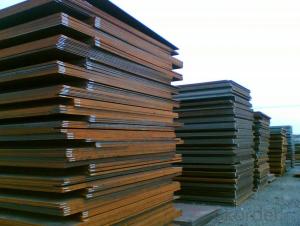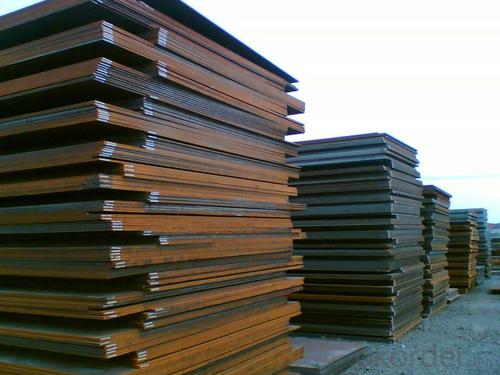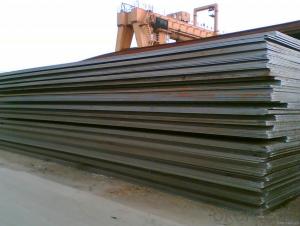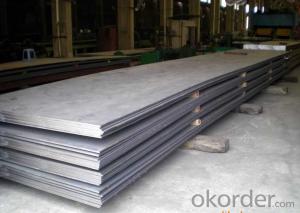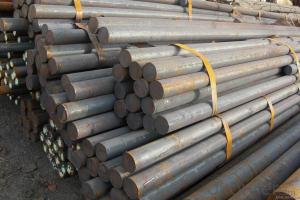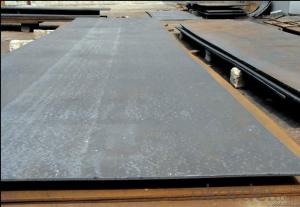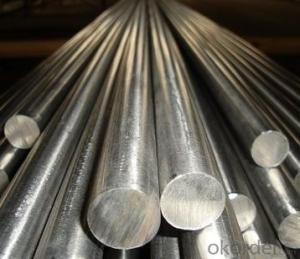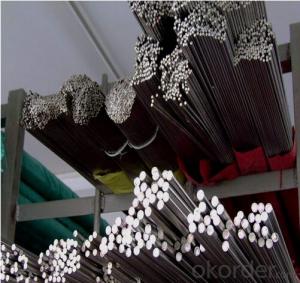D3M Steel Plate Special Steel Carbon Steel
- Loading Port:
- China main port
- Payment Terms:
- TT OR LC
- Min Order Qty:
- 25 m.t.
- Supply Capability:
- 10000 m.t./month
OKorder Service Pledge
OKorder Financial Service
You Might Also Like
Specification
Chemical Composition(GB %)
| C | Si | Mn | Cr | V | S | P |
| 1.4 | 0.35 | 0.35 | 8.00 | 0.15 | ≤0.030 | ≤0.030 |
Available Size
| Rolled flat steel | 12-90mm×205-610mm×L |
Heat Treatment
| Item | Temperature℃ | Hardness |
| Anneal | 850-870 | ≤255HB |
| Quenching | 920-980 | 64-66HRC |
| Tempering | 200 | 61-63HRC |
Characterstics
| 1.New type of chromium containing high carbon cold working die steel | |||||
| 2.Better hardening ability and high abrasion resistance |
Applications: Suitable for various codl working dies with higher abrasion resistance


1, Your advantages?
professional products inquiry, products knowledge train (for agents), smooth goods delivery, excellent customer solution proposale
2, Test & Certificate?
SGS test is available, customer inspection before shipping is welcome, third party inspection is no problem
3, Payment Terms?
30% TT as deposit and 70% before delivery.
Irrevocable L/C at sight.
4, Trading Terms?
EXW, FOB, CIF, FFR, CNF
3, After-sale Service?
We provides the services and support you need for every step of our cooperation. We're the business partner you can trust.
For any problem, please kindly contact us at any your convenient time.
We'll reply you in our first priority within 24 hours.
- Q: What are the different power generation grades of special steel?
- There are several different power generation grades of special steel used in various applications within the power generation industry. These grades are specifically designed to withstand high temperatures, pressures, and corrosive environments encountered in power plants. One common grade is known as 9Cr-1Mo-V steel, also referred to as Grade 91. It is a high-strength, low-alloy steel that is widely used in the construction of boiler components such as headers, tubes, and turbine rotors. Grade 91 steel offers excellent creep strength, oxidation resistance, and thermal stability, making it suitable for high-temperature operations. Another grade commonly used in power generation is 12Cr-1Mo-V steel, also known as Grade 11. It is primarily used in the fabrication of superheater and reheater tubes for power boilers. Grade 11 steel exhibits good high-temperature strength, corrosion resistance, and weldability, making it ideal for these applications. Additionally, there is a grade called 2.25Cr-1Mo steel (Grade 22) which is often used in the construction of pressure vessels and piping systems in power plants. It has excellent creep resistance, high-temperature strength, and resistance to hydrogen attack, making it suitable for critical components in power generation facilities. Furthermore, there are other specialized grades like 5Cr-0.5Mo steel (Grade 5) and 9Cr-0.5Mo steel (Grade 9) that are used in specific power generation applications where elevated temperatures and pressures are encountered. These grades offer a combination of strength, corrosion resistance, and thermal stability to ensure reliable performance in demanding environments. In summary, the power generation industry utilizes various grades of special steel specifically designed to meet the unique requirements of power plants. These grades provide high-temperature strength, corrosion resistance, and other essential properties necessary for efficient and reliable power generation operations.
- Q: Can special steel be used for making power generation equipment?
- Yes, special steel can be used for making power generation equipment. Special steels are specifically designed to have enhanced properties such as high strength, corrosion resistance, heat resistance, and wear resistance. These properties make special steel suitable for use in demanding applications such as power generation equipment, which often operates under high temperatures and pressures. Power generation equipment, such as turbines, boilers, and generators, require materials that can withstand harsh operating conditions and deliver reliable performance over an extended period. Special steel grades, such as stainless steels, nickel-based alloys, and heat-resistant steels, are commonly used in the construction of power plants and power generation equipment. Stainless steels are frequently used in power generation due to their excellent corrosion resistance, which is crucial for equipment exposed to high moisture or aggressive environments. Nickel-based alloys are renowned for their exceptional high-temperature strength, making them ideal for components subjected to extreme heat, such as turbine blades or exhaust systems. Heat-resistant steels, on the other hand, are specifically designed to retain their mechanical properties at elevated temperatures, making them suitable for applications such as boilers and heat exchangers. In summary, special steel offers a range of desirable properties that make it highly suitable for manufacturing power generation equipment. Its strength, corrosion resistance, heat resistance, and wear resistance make it an excellent choice for withstanding the demanding conditions found in power plants and ensuring the reliable and efficient generation of electricity.
- Q: Can special steel be used in the mining equipment manufacturing industry?
- Yes, special steel can be used in the mining equipment manufacturing industry. Special steel, often known as alloy steel, offers improved strength, durability, and resistance to wear and corrosion compared to standard steel. These properties make it well-suited for the harsh and demanding conditions encountered in mining operations. Special steel can be utilized in various mining equipment components, such as drill bits, crushers, conveyor systems, and excavator buckets, to enhance their performance and prolong their lifespan.
- Q: What are the different galvanizing techniques used for special steel?
- There are several galvanizing techniques used for special steel, including hot-dip galvanizing, electro-galvanizing, and mechanical galvanizing. Hot-dip galvanizing involves immersing the steel in a bath of molten zinc, creating a thick, durable coating. Electro-galvanizing, on the other hand, uses an electrical current to deposit a thin layer of zinc onto the steel surface. Mechanical galvanizing involves tumbling the steel in a zinc powder and glass bead mixture, which adheres to the surface through friction. Each technique has its own advantages and is used depending on the specific requirements of the application.
- Q: What are the different methods for surface hardening special steel?
- There are several methods available for surface hardening special steel, each with its specific advantages and applications. Some of the commonly used methods are: 1. Carburizing: This process involves heating the steel in a carbon-rich environment, typically using a gas or liquid medium. The carbon atoms diffuse into the steel's surface, forming a high-carbon layer, which results in increased hardness. Carburizing is suitable for complex-shaped parts and provides good wear resistance. 2. Nitriding: Nitriding is a process where the steel is exposed to nitrogen-rich atmospheres at elevated temperatures. The nitrogen atoms diffuse into the steel's surface, forming nitrides, which significantly enhance the surface hardness and wear resistance. Nitriding is often used for parts requiring high fatigue strength and resistance to galling and fretting. 3. Induction hardening: Induction hardening utilizes high-frequency alternating currents to heat the steel's surface rapidly. This localized heating is followed by quenching, creating a hardened layer. Induction hardening is ideal for parts with localized wear areas or where only specific regions need to be hardened. 4. Flame hardening: Flame hardening involves heating the steel's surface to a high temperature using an oxy-fuel flame and then rapidly quenching it. This method is suitable for large and heavy parts that require deep hardening. Flame hardening provides good wear resistance and toughness. 5. Laser hardening: Laser hardening is a precise and localized surface hardening technique. A laser beam is used to heat the steel's surface, and quenching is performed afterward. This method offers high flexibility and control, making it suitable for complex geometries and small areas that require hardness improvement. 6. Carbonitriding: Carbonitriding is a combination of carburizing and nitriding processes. The steel is exposed to an atmosphere containing both carbon and nitrogen, resulting in the formation of a compound layer with improved hardness and wear resistance. Carbonitriding is commonly used for parts requiring a balance of hardness, toughness, and wear resistance. It is important to note that the selection of the appropriate surface hardening method depends on factors such as the specific steel composition, desired hardness depth, part geometry, intended application, and cost considerations.
- Q: How does special steel perform under extreme cold conditions?
- Special steel is specifically designed to perform well under extreme cold conditions. It has excellent resistance to low temperatures and retains its strength and toughness even in freezing temperatures. This is achieved through the addition of alloying elements such as nickel, chromium, and molybdenum, which enhance the steel's ability to remain ductile and resist brittle fracture. In extreme cold temperatures, regular steel tends to become brittle and may fracture easily. However, special steel exhibits remarkable toughness and resilience. It can withstand the extremely low temperatures without losing its mechanical properties, making it suitable for various applications in cold environments. Moreover, special steel also offers excellent corrosion resistance, which is crucial when exposed to extreme cold conditions. Corrosion can be accelerated in cold environments due to factors like moisture, salt, and freezing and thawing cycles. However, the corrosion-resistant properties of special steel prevent it from deteriorating and maintain its structural integrity. Additionally, special steel has superb thermal conductivity, allowing it to efficiently transfer heat even in extremely low temperatures. This characteristic is essential in applications where heat transfer is critical, such as in cryogenic systems or cold storage facilities. Overall, special steel's exceptional performance under extreme cold conditions makes it an ideal material for various industries and applications, including aerospace, oil and gas, automotive, and construction. Its ability to maintain strength, toughness, corrosion resistance, and thermal conductivity at low temperatures ensures reliable and safe operation in severe cold environments.
- Q: What are the different heat treatment processes used in special steel?
- Some of the different heat treatment processes used in special steel include annealing, normalizing, tempering, quenching, and case hardening.
- Q: What are the limitations of special steel?
- Some limitations of special steel include its high cost and limited availability, as well as the difficulty in shaping and processing it. Additionally, special steel may have lower tensile strength compared to other materials and can be prone to corrosion if not properly maintained.
- Q: How does special steel respond to welding?
- Special steel, also known as alloy steel, typically responds well to welding. Its composition, which includes various alloying elements, enhances its weldability and allows for strong and reliable weld joints. However, the specific response to welding can vary depending on the type and grade of special steel. It is crucial to choose the appropriate welding technique, filler material, and heat treatment to ensure optimal results and minimize any potential issues such as cracking or distortion.
- Q: How does special steel perform in terms of thermal conductivity?
- Special steel typically has lower thermal conductivity compared to other materials. This means that it is not as efficient in conducting heat and may retain heat for longer periods of time.
Send your message to us
D3M Steel Plate Special Steel Carbon Steel
- Loading Port:
- China main port
- Payment Terms:
- TT OR LC
- Min Order Qty:
- 25 m.t.
- Supply Capability:
- 10000 m.t./month
OKorder Service Pledge
OKorder Financial Service
Similar products
Hot products
Hot Searches
Related keywords
